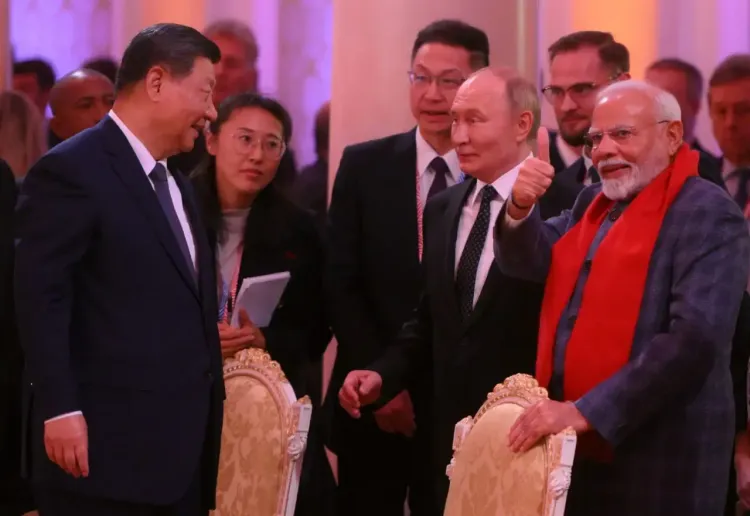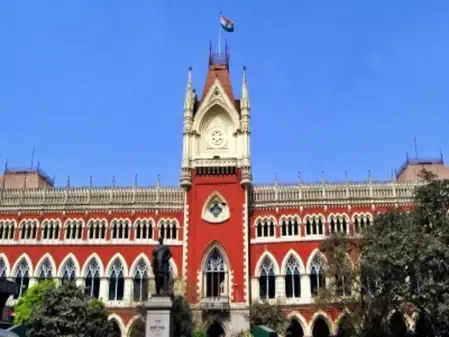Is BRICS Advocating for Reforms While Maintaining the Existing System?

Synopsis
Key Takeaways
- BRICS nations are increasingly united in their opposition to coercive economic measures.
- The group represents nearly half of the global population and a significant portion of GDP.
- De-dollarisation is becoming more pronounced, particularly in commodity markets.
- BRICS is advocating for reforms within existing global economic structures.
- Recent expansions have enhanced BRICS's global representation and influence.
New Delhi, Sep 29 (NationPress) The persistent efforts of US President Donald Trump to undermine a Global South initiative by targeting its members 'brick-by-brick' through punitive tariffs and derogatory remarks may have inadvertently strengthened the unity among these nations.
On September 27, the Foreign Ministers of BRICS countries expressed their commitment to stand together against "coercion that could further diminish global trade, disrupt supply chains, or create uncertainty in international economic and trade activities..."
The White House views BRICS nations as a challenge to US dominance. Currently, this group represents nearly half of the world’s population and about 40 percent of the global GDP, accounting for approximately 26 percent of international trade. Its inaugural meeting occurred at the ministerial level in 2006, similar to the recent gathering during the United Nations General Assembly in New York. Three years later, the heads of member states convened for their first summit in 2009 in Ekaterinburg, Russia.
The term BRIC was first introduced in 2001 by Goldman Sachs in their Global Economics Paper titled "The World Needs Better Economic BRICs," which predicted that these four economies would significantly increase their economic influence over the next half-century.
BRIC expanded to BRICS with South Africa's inclusion at a foreign ministers' meeting in New York in 2010. The group further grew in 2024, welcoming Egypt, Ethiopia, Iran, and the UAE as new full members starting January 1, 2024. In 2025, Indonesia will join BRICS as a full member, while several countries including Belarus, Bolivia, Kazakhstan, Cuba, Malaysia, Nigeria, Thailand, Uganda, and Uzbekistan are set to become partner nations.
Recently, President Trump has cautioned the bloc against pursuing a "de-dollarisation strategy."
A recent article from the policy institute Chatham House noted that "Washington is leveraging Brazil to caution other nations, especially BRICS members like South Africa and India, regarding issues such as managing digital communications, adopting alternative currencies for trade, and maintaining relations with China."
A J.P. Morgan study in July highlighted that de-dollarisation is particularly evident in commodity markets, where the US dollar's pricing influence has waned.
Due to Western sanctions, Russian oil products are now being sold to eastern and southern buyers in local currencies or currencies of nations considered friendly, as cited in their findings.
"Among buyers, countries like India, China, and Turkey are exploring alternatives to the dollar," the report stated. "Despite the US dollar losing some ground to nontraditional currencies in global foreign exchange reserves, it remains the dominant reserve currency," as per the views of three respected economists affiliated with the IMF.
Various reports indicate that the US dollar still dominates nearly 90 percent of global transactions and constitutes about 59 percent of foreign exchange reserves. Consequently, many economists argue that the threat of de-dollarisation remains a distant concern.
Washington might also react negatively to the BRICS Foreign Ministers' meeting on Saturday, which reiterated their "strong support" for Ethiopia and Iran’s bids for accession to the WTO. They also condemned "the military strikes against Iran since June 13, 2025."
As noted by the Chatham House article, "While a loosely structured alliance, the BRICS group has gained traction in recent years. Nations like Brazil, India, and South Africa are advocating for a series of reforms in commercial, financial, and multilateral systems without completely severing ties with the existing structure."









